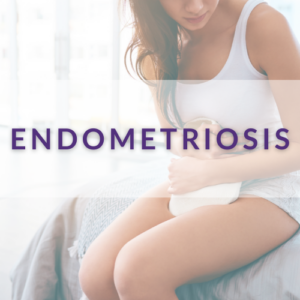Endometriosis

Endometriosis is a condition in which the cells that make up the lining of the uterus (the endometrium) are found outside the lining of the uterus. It is very common occurring in 1 in 10 women of reproductive age.
Many women with endometriosis have little to no symptoms. Others have severe pain which interferes with their daily life. Endometriosis is also a major cause of infertility -40 % of infertility may be due to endometriosis.
Endometriosis is usually diagnosed in women in their 30’s but can occur at any age. It can be more common if a patient has a family history of endometriosis. Pregnancy can help with endometriosis symptoms. The symptoms almost always go away with menopause.
The most common symptoms of endometriosis is chronic pelvic pain. The pain is often worse just before and during the menstrual period. Dysmenorrhea is pain that occurs with menstruation. In a woman with endometriosis the dysmenorrhea gets worse over time. Women may also have deep pain with intercourse. They can also have bowel and urine related symptoms. Heavy menstrual periods can also be a symptom.
Endometriosis is often diagnosed by symptoms. Your provider may also order an ultrasound. The only sure way to make a diagnosis is by surgery. The surgery would be a laparoscopy which is done under anesthesia in the hospital. It may also be a way to treat the endometriosis by burning any obvious signs of the disease.
There are several treatments that work for endometriosis. Birth control pills are a good option as well as a Mirena IUD. There are several other medications such as Lupron and Orlissa which tricks your body into being menopausal. As discussed before, laparoscopy is a good way to make a diagnosis and treat the endometriosis. This will often give a women temporary relief. The surgery is also combined with medications to keep the symptoms from coming back. In about 40-80% of women the symptoms return after a laparoscopy. In severe cases when nothing will help the pain a hysterectomy may be needed.
Endometriosis is a chronic condition. Many women have symptoms that come and go until menopause. There are many treatments available to give a woman relief.
Please talk to your provider if you think you may have endometriosis or have any questions.